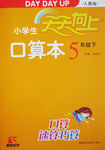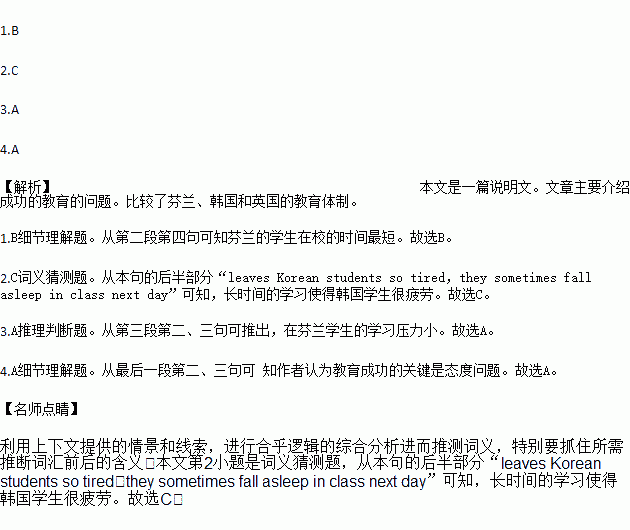题目内容
Whenever anyone measures educational success, East Asian countries are always top scorers. But in a recent league table, a European country, Finland, was top of the class. South Korea was still in second place, though. Britain was at number 6.
In Korea the school day is long?typically 7 or 8 hours, followed by hours of private tutoring in the evenings. All_this_hothousing leaves Korean students so tired, they sometimes fall asleep in class next day. Worries about the effects of late night cramming (填鸭式) led the government to force cramming schools to close by 10 pm.Finnish children spend the least time in class in the developed world, often finishing just after lunch, with about one hour of homework a day. Private tuition is uncommon. The British and American school day is quite long in comparison, around 6 hours, and secondary school pupils do 2 or 3 hours of self?study a night.
The Korean education system, like many in Asia, is intensely competitive, with students even competing to get into the best cramming schools, to help them get ahead. Finnish education is far less cut?throat. Classes are all mixed ability, and there are no league tables. British schools again occupy the middle ground, with quite high levels of competition for places at university, and schools and universities battling to come top of league tables for everything from exam results to student satisfaction. Korea and Finland both do well, yet their education systems are so different.
However, there are some similarities in Korea and Finland. In those countries, teachers have high status in society, and education is very highly valued. Those attitudes can't change quickly. But it can be done. They might be the star pupils now, but until the 1970s, Finland's educational system was poor. Their thoroughly different approach to schooling has taken them to the top in just a generation.
1.The students spend the least time in school in ________.
A. the UK B. Finland
C. the USA D. Korea
2.The underlined phrase “all this hothousing” in Paragraph 2 probably refers to ________.
A. private evening tutoring
B. self?study at home
C. long?hour study
D. school study
3.From Paragraph 3, we can know that ________.
A. Finnish students are less stressed in study
B. there're also many cramming schools in Britain
C. students in Korea are the most competitive in Asia
D. British schools are less competitive than universities
4.According to the author, the key to improving education is ________.
A. the attitude
B. the schooling time
C. star pupils
D. new teaching approach
 天天向上口算本系列答案
天天向上口算本系列答案

